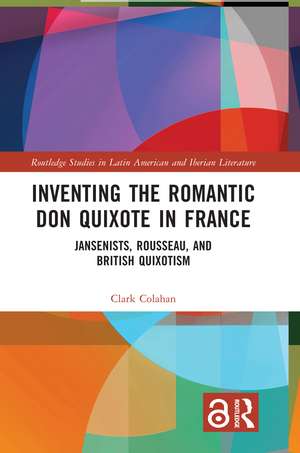Inventing the Romantic Don Quixote in France: Jansenists, Rousseau, and British Quixotism: Routledge Studies in Latin American and Iberian Literature
Autor Clark Colahanen Limba Engleză Paperback – 28 noi 2024
Introduction of this book is freely available as a downloadable Open Access PDF at http://www.taylorfrancis.com under a Creative Commons [Attribution-Non Commercial-No Derivatives (CC-BY-NC-ND)] 4.0 license.
| Toate formatele și edițiile | Preț | Express |
|---|---|---|
| Paperback (1) | 311.06 lei 6-8 săpt. | |
| Taylor & Francis – 28 noi 2024 | 311.06 lei 6-8 săpt. | |
| Hardback (1) | 1000.93 lei 6-8 săpt. | |
| Taylor & Francis – 22 iun 2023 | 1000.93 lei 6-8 săpt. |
Preț: 311.06 lei
Nou
Puncte Express: 467
Preț estimativ în valută:
59.52€ • 62.37$ • 49.20£
59.52€ • 62.37$ • 49.20£
Carte tipărită la comandă
Livrare economică 12-26 aprilie
Preluare comenzi: 021 569.72.76
Specificații
ISBN-13: 9781032467269
ISBN-10: 1032467266
Pagini: 226
Ilustrații: 62
Dimensiuni: 152 x 229 mm
Greutate: 0.42 kg
Ediția:1
Editura: Taylor & Francis
Colecția Routledge
Seria Routledge Studies in Latin American and Iberian Literature
Locul publicării:Oxford, United Kingdom
ISBN-10: 1032467266
Pagini: 226
Ilustrații: 62
Dimensiuni: 152 x 229 mm
Greutate: 0.42 kg
Ediția:1
Editura: Taylor & Francis
Colecția Routledge
Seria Routledge Studies in Latin American and Iberian Literature
Locul publicării:Oxford, United Kingdom
Public țintă
Academic and PostgraduateCuprins
Author’s foreword
Synopsis
Introduction
Chapter One: Hagiography and the religious side of Don Quixote’s parodic journey
Cervantes’ use of saints’ lives
St. Thomas of Villanueva
Traits and adventures of Don Quixote and Sancho running parallel to those of Brother Thomas.
Chapter Two: The Jansenist milieu
The Filleau brothers and Jansenism
Jansenist teachings
Filleau de la Chaise’s essay on Pascal’s Pensées
Chapter Three: Don Quixote’s rise toward moral exemplarity
A Jansenist tone
Protestant affinities
Dulcinea and faith
Chapter Four: Don Quixote as high moral achiever
Transforming Don Quixote and Sancho
Don Quixote doing good in the world, mostly
Pride goes before a fall
Chapter Five: Sancho as backsliding social climber
Toward the utopia of fraternity and equality
Increasing day by (every other) day in wisdom and strength
Chapter Six: Reason, trust, and which way lies happiness?
Reason
Parafaragaramus and confusing choices
Chapter Seven: Magicians in Commedia dell’Arte and the Quixote sequel
"The Fake Necromancer"
Practical jokers
"Mother Goose" and "The Barrel"
The magician as director of tragi-comedy
Chapter Eight: Rousseau’s recasting of Parafaragaramus
Trickery versus tenderness
Taking courage through trust
Justice versus sadism in society
Chapter Nine: Magician Overboard Downstream
Benevolent and effective
All-knowing denouncer of misdeeds
Active pursuer of delinquents
Thief of happiness
Stage magician
Object of Ridicule
Magician as dangerous scientist harming nature
Chapter Ten: The British Don Quixote: good-humored laughter and utopias
Sarah Fielding on selfless friendship and Henry Brooke on Don Quixote’s humanitarianism
The split English reaction to Don Quixote’s ‘Enthusiasm’
Rousseau’s impact
Coleridge and Don Quixote through the lens of German philosophy
Chapter Eleven: Rousseau’s Julie - reliving Don Quixote’s failed quest
Summary and Take-away
Works Cited
Index
Synopsis
Introduction
Chapter One: Hagiography and the religious side of Don Quixote’s parodic journey
Cervantes’ use of saints’ lives
St. Thomas of Villanueva
Traits and adventures of Don Quixote and Sancho running parallel to those of Brother Thomas.
Chapter Two: The Jansenist milieu
The Filleau brothers and Jansenism
Jansenist teachings
Filleau de la Chaise’s essay on Pascal’s Pensées
Chapter Three: Don Quixote’s rise toward moral exemplarity
A Jansenist tone
Protestant affinities
Dulcinea and faith
Chapter Four: Don Quixote as high moral achiever
Transforming Don Quixote and Sancho
Don Quixote doing good in the world, mostly
Pride goes before a fall
Chapter Five: Sancho as backsliding social climber
Toward the utopia of fraternity and equality
Increasing day by (every other) day in wisdom and strength
Chapter Six: Reason, trust, and which way lies happiness?
Reason
Parafaragaramus and confusing choices
Chapter Seven: Magicians in Commedia dell’Arte and the Quixote sequel
"The Fake Necromancer"
Practical jokers
"Mother Goose" and "The Barrel"
The magician as director of tragi-comedy
Chapter Eight: Rousseau’s recasting of Parafaragaramus
Trickery versus tenderness
Taking courage through trust
Justice versus sadism in society
Chapter Nine: Magician Overboard Downstream
Benevolent and effective
All-knowing denouncer of misdeeds
Active pursuer of delinquents
Thief of happiness
Stage magician
Object of Ridicule
Magician as dangerous scientist harming nature
Chapter Ten: The British Don Quixote: good-humored laughter and utopias
Sarah Fielding on selfless friendship and Henry Brooke on Don Quixote’s humanitarianism
The split English reaction to Don Quixote’s ‘Enthusiasm’
Rousseau’s impact
Coleridge and Don Quixote through the lens of German philosophy
Chapter Eleven: Rousseau’s Julie - reliving Don Quixote’s failed quest
Summary and Take-away
Works Cited
Index
Notă biografică
Clark Colahan is Anderson Professor of Humanities, Emeritus, at Whitman College, USA. He is the author of several books and numerous articles on Spanish and French literature of the Early Modern period and the Enlightenment. He is the author of The Visions of Sor María de Agreda: Writing Knowledge and Power, the co-editor of Spanish Humanism on the Verge of the Picaresque, and the co-author of the English translation of Cervantes’ last novel, The Trials of Persiles and Sigismunda.
Descriere
The evolving adventures and myth of Don Quixote from farcical social criticism to Romantic idealism and then melancholy. Hagiography, Jansenism and its interpretation of Pascal’s break with empiricism, Sarah and Henry Fielding, and Rousseau’s use of the Jansenist sequel to Don Quixote.












